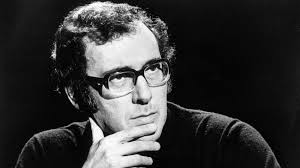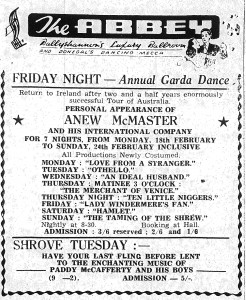 Ballyshannon Drama Society’s production of Pinter’s ‘Old Times’ opens on Tuesday February 9th in the Abbey Arts Centre, Ballyshannon, but did you know this production also marks a return to Ballyshannon for Harold Pinter, considered by many to be one of the finest dramatists of the modern era?
Ballyshannon Drama Society’s production of Pinter’s ‘Old Times’ opens on Tuesday February 9th in the Abbey Arts Centre, Ballyshannon, but did you know this production also marks a return to Ballyshannon for Harold Pinter, considered by many to be one of the finest dramatists of the modern era?
Pinter, born in Hackney, London, in 1930, was drawn to the theatre from a young age, playing Macbeth in his school production in 1947. He later enrolled in the Royal Academy of Dramatic Arts but felt uncomfortable with the snobbery of the institution, and quietly dropped out. In 1951 he replied to an ad in a theatre magazine for a part in a touring company, sending off a photo of himself, then auditioning in a flat in Willesden Junction. The company was the Anew McMasters repertory company, which toured Ireland in the 1950s, bringing professional productions to small towns in a time before the drama circuit had become established.
McMasters gave Pinter his first real acting job, one which he could not resist: “He offered me six pounds a week, said I could get digs for twenty-five shillings at the most, told me how cheap cigarettes were and that I could play Horatio, Bassanio and Cassio.” After two weeks rehearsal in Dublin, the company took to the road, visiting Skibbereen, Tralee, Dundalk, Ballina, Athlone, Mullingar, Sligo and Ballyshannon.
 From Monday the 18th to Sunday the 24th of February 1952, the Anew McMasters’ touring company produced nine plays in the Abbey Ballroom, including Shakespeare’s ‘Hamlet’, ‘Othello’, ‘The Taming of the Shrew’ and Wilde’s ‘Lady Windermere’s Fan’ (and a rather offensively-titled production on Thursday night – apologies, ed.) each show opening at 8.30pm, with tickets costing 3/6. Pinter most likely performed as Iago to Mc Masters’ Othello, amongst other roles. There were 17 in the company at the time.
From Monday the 18th to Sunday the 24th of February 1952, the Anew McMasters’ touring company produced nine plays in the Abbey Ballroom, including Shakespeare’s ‘Hamlet’, ‘Othello’, ‘The Taming of the Shrew’ and Wilde’s ‘Lady Windermere’s Fan’ (and a rather offensively-titled production on Thursday night – apologies, ed.) each show opening at 8.30pm, with tickets costing 3/6. Pinter most likely performed as Iago to Mc Masters’ Othello, amongst other roles. There were 17 in the company at the time.
Also part of the company was Sligo actress Pauline Flanagan, whose parents had both been Mayor of Sligo at different times. Pinter and Flanagan began a substantial relationship. Pinter visited her Sligo home, and she travelled to Hackney to meet his family. There was even talk of marriage, but it is believed that Harold’s mother was not too keen on her son marrying an Irish Catholic, although it’s easy to imagine Miss Flanagan’s family had similar reservations about her marrying a Jewish actor.
Years later, Pinter would recall, ‘Ireland wasn’t golden always but it was golden sometimes, and in 1950 [actually 1951-53] it was, all in all, a golden age for me and for others”; humble beginnings for a man would would go on to receive the Nobel Prize for Literature in 2005.
